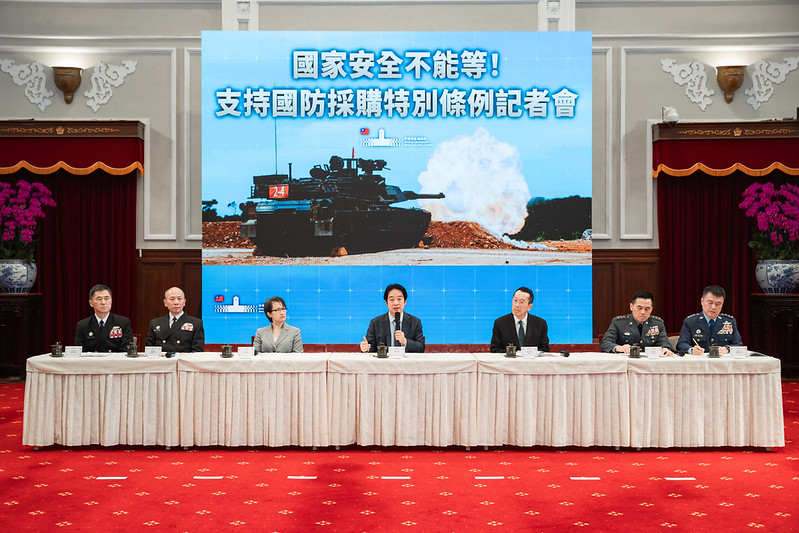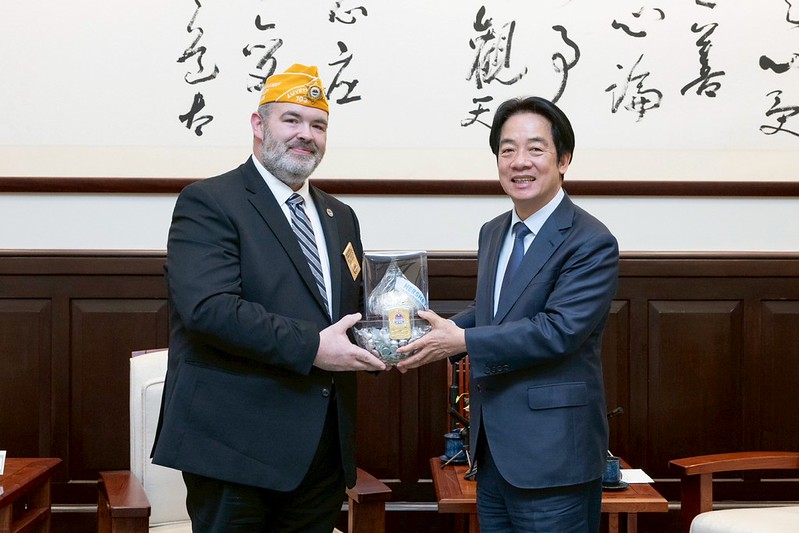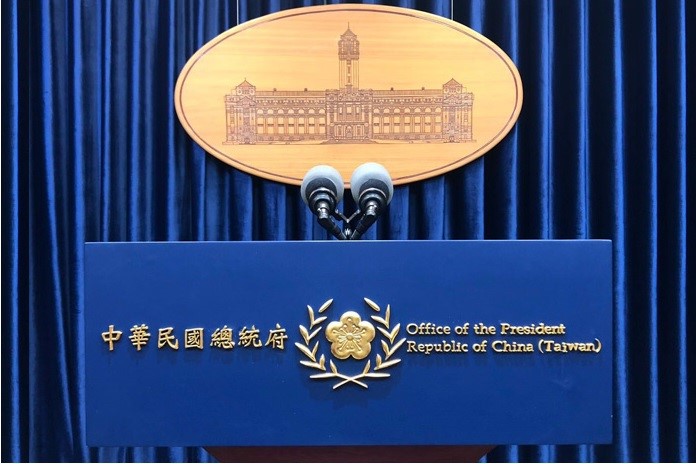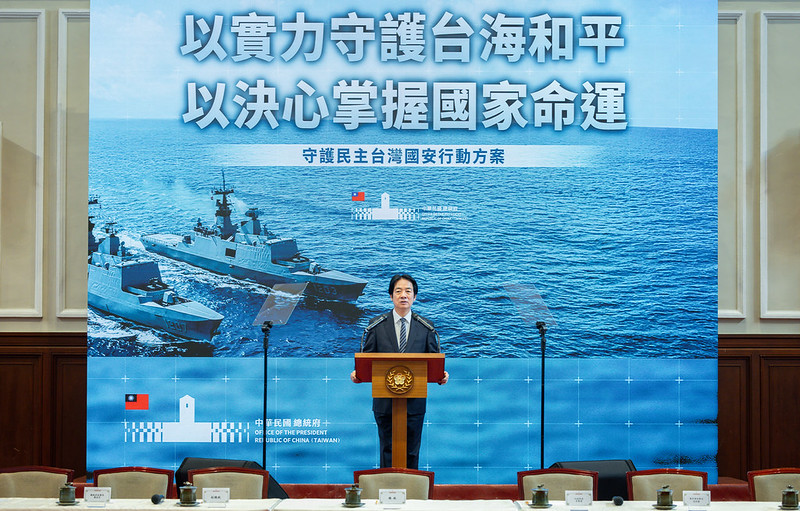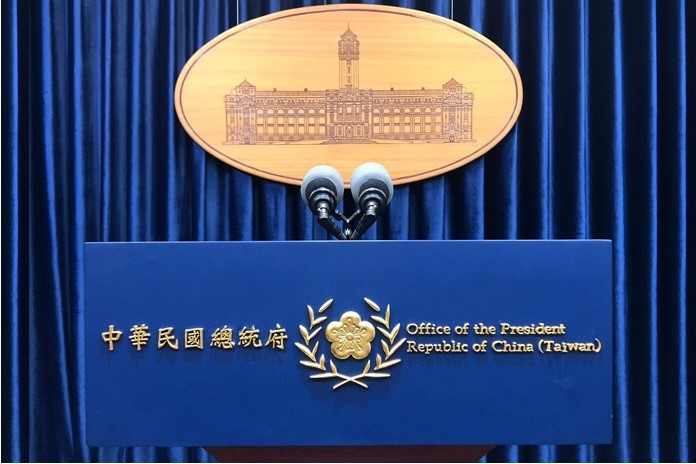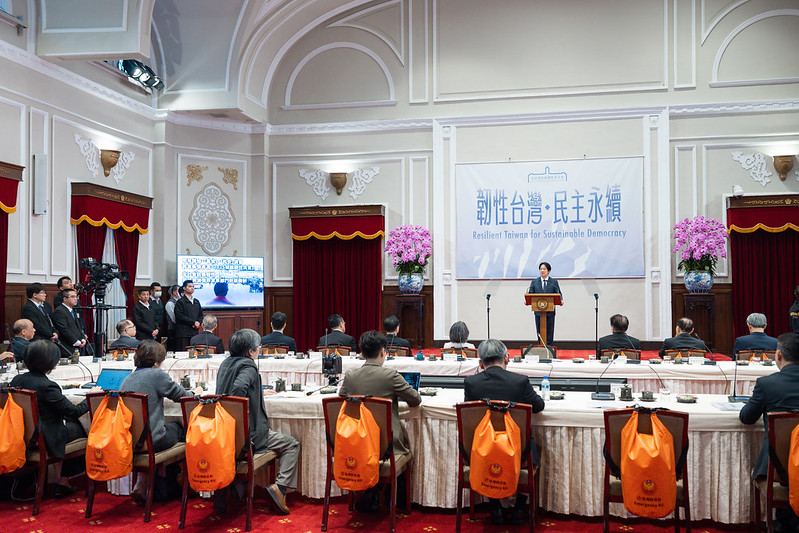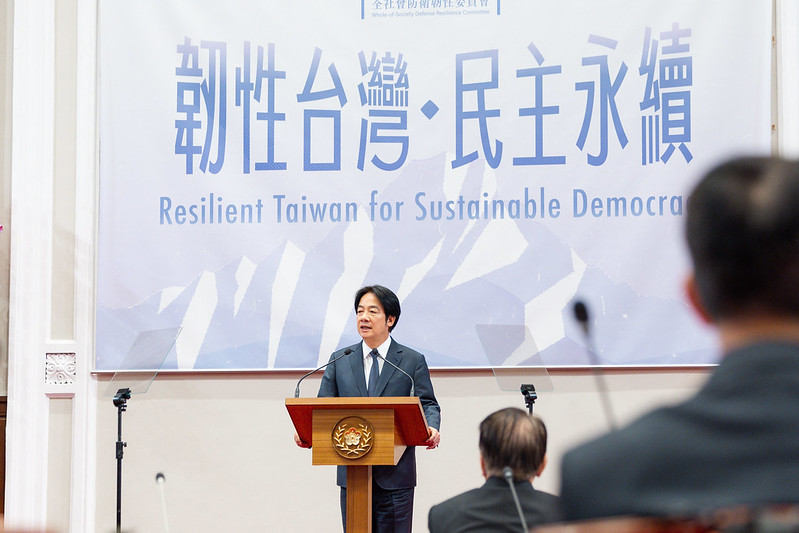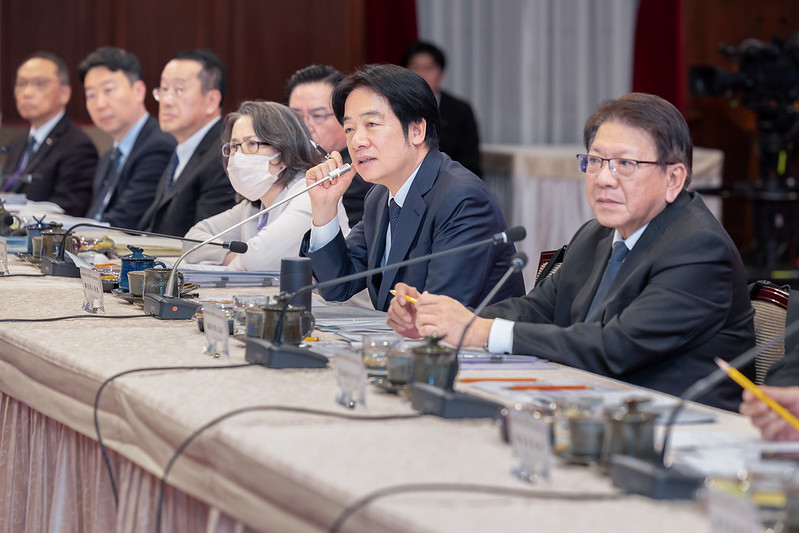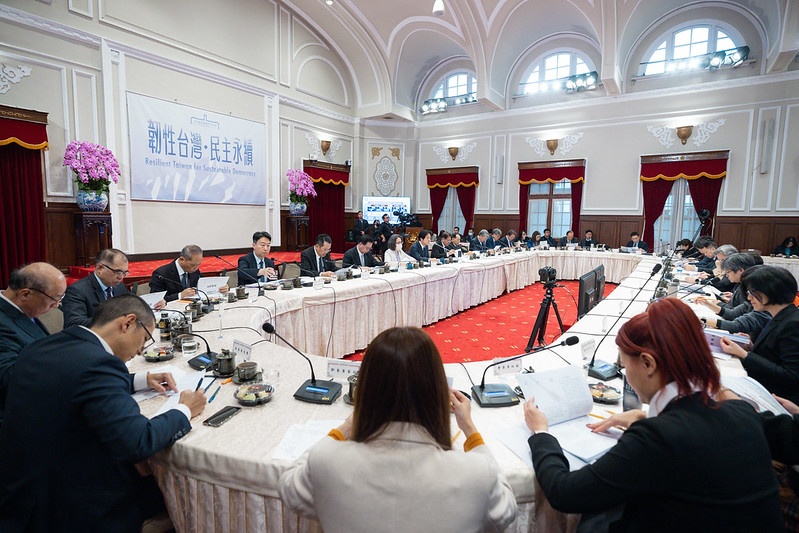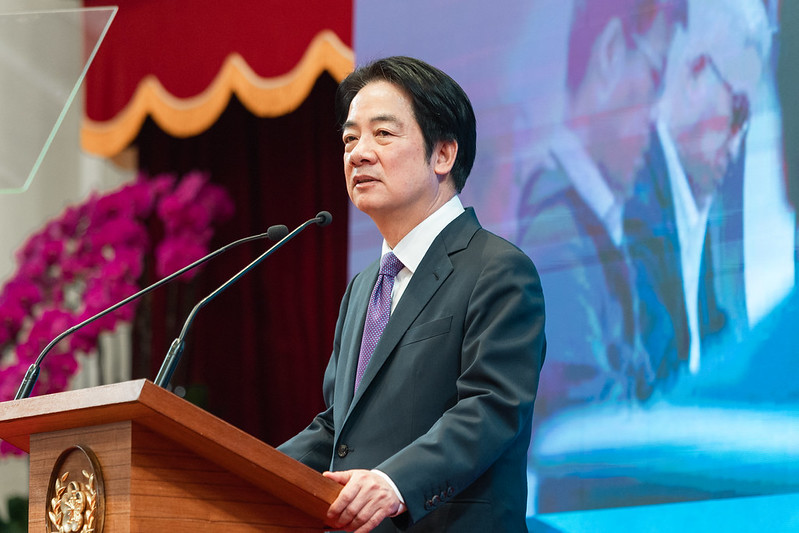News & activities
 News releases
News releases
On the afternoon of December 26, President Lai Ching-te presided over the second meeting of the Whole-of-Society Defense Resilience Committee. President Lai stated that the committee’s goal is to enhance overall resilience in terms of national defense, economic livelihoods, disaster prevention, and democracy through five key areas: civilian force training and utilization, strategic material preparation and critical supply distribution, energy and critical infrastructure operations and maintenance, social welfare, medical care, and evacuation facility readiness, and information, transportation, and financial network protection. That morning, he said, was the first time that central and local government officials, as well as civilian observers, gathered at the Presidential Office to conduct cross-disciplinary tabletop exercises, demonstrating cooperation between central and local governments to jointly enhance social resilience.
President Lai also announced that the existing Wan An and Min An Exercises, which are air raid drills and disaster response drills, respectively, beginning from next year will be combined into the 2025 Urban Resilience Exercises, the nomenclature of which matches up with that of similar exercises carried out overseas. The exercises, he said, will strengthen the defensive mechanisms of the non-military sector, and verify the ability of civil defense and disaster preparedness systems to protect our nation’s people. The president emphasized that combining government and private-sector forces is the only way to strengthen Taiwan’s overall defense capabilities, jointly consolidate global democratic resilience, and maintain regional peace and stability.
A translation of President Lai’s opening statement follows:
Today, we are convening the second meeting of the Whole-of-Society Defense Resilience Committee, implementing the conclusions reached at the last meeting, conducting tabletop exercises, and verifying the preparedness of government agencies to address extreme situations.
Looking back over the past year, circumstances at home and abroad have changed rapidly. Authoritarian states around the world continue to converge, threatening the rules-based international order, and they now present a collective challenge to the peace and stability of the entire first island chain.
To address threats, whether natural disasters or ambitions for authoritarian expansion, we believe that as long as the government and all of society are prepared, we can respond. With determination, there is no need to worry. With confidence, our people can rest assured. This is the goal of whole-of-society defense resilience. Of course, these preparations are not easy. Taiwan’s society must race against time, and work together to build capabilities to respond to major disasters and threats, and deter enemy encroachment.
Therefore, the goal of this committee is to formulate action plans through the five key areas: civilian force training and utilization, strategic material preparation and critical supply distribution, energy and critical infrastructure operations and maintenance, social welfare, medical care, and evacuation facility readiness, and information, transportation, and financial network protection, thereby verifying central and local government capacities to respond in times of disaster, and enhance overall resilience in terms of national defense, economic livelihoods, disaster prevention, and democracy.
This morning at the Presidential Office, we conducted the first-ever cross-disciplinary tabletop exercises involving central and local government officials as well as civilian observers. Participating teams from central government departments were all led by deputy ministers, Tainan City Deputy Mayor Yeh Tse-shan (葉澤山) led a team, and Tainan Mayor Huang Wei-che (黃偉哲) also came to participate, demonstrating cooperation between central and local governments to jointly enhance social resilience.
The exercises were based on Taiwan’s mature disaster prevention and relief system’s response to comprehensive threats. We had scenarios, but no scripts, so the participating units did not prepare notes in advance, but reacted on the spot. When presented with a problem, they proposed countermeasures, which is closer to a real crisis situation.
To address the continued threat of authoritarian expansion to regional stability and order, in the first scenario we simulated that a high-intensity gray-zone operation occurred; in the second scenario, we simulated a state of being on the verge of conflict. The most important core objectives of the exercises were to ensure that people could carry on their daily lives and that society could function normally.
I would like to thank our three deputy conveners for serving as exercise commanders, Minister of the Interior Liu Shyh-fang (劉世芳) and Minister without Portfolio of the Executive Yuan Chi Lien-cheng (季連成) for serving as deputy exercise commanders, and Deputy Secretary-General to the President Chang Tun-han (張惇涵) as well as National Security Council Deputy Secretary-General Lin Fei-fan (林飛帆) for serving as chief officials. I also want to thank all our advisors, committee members, and colleagues from government agencies at both the central and local levels for coming together to complete tabletop exercises aimed at testing out components of the five key areas.
After conducting numerous exercises in the past, many government agencies improved their emergency response capabilities, and I want to recognize those achievements. However, I also want to emphasize that we must identify problems in our current systems, and then make improvements. Whether it be the central or the local level, we cannot just talk about the good things and sweep the unpleasant things under the rug. We have to rigorously ascertain numbers and make sure just how accurate the sources of our information are, because it is always a good thing when we discover problems in our exercises, and find places where improvements are needed. This means that our testing has achieved its purpose, and that there is much room for progress and improvement.
I also want to report to you all that, over the past few years, due to the global pandemic and Russia’s invasion of Ukraine, countries throughout the world have been bolstering their defense resilience. NATO and the European Union, for example, have both adopted guidelines aimed at strengthening whole-of-society resilience. This shows that Taiwan is not a special case. The task of whole-of-society defense resilience is being addressed throughout the world. Taiwan’s ongoing efforts to strengthen its whole-of-society defense resilience is something the international community at large is wanting to see.
This month I visited the Republic of the Marshall Islands, Tuvalu, and the Republic of Palau, all of which are Pacific allies of Taiwan, and I made transit stops in the United States islands of Hawaii and Guam. Friends in each of these places expressed firm support for Taiwan and repeatedly said they hope for peace and stability in the Taiwan Strait.
We must continue taking action to respond to the international community’s support. Taiwan must have the capability to defend its own security. As president, I want to take this opportunity to emphasize to the international community that Taiwan is determined to defend regional peace and stability. We will accelerate the pace of efforts to build a more resilient Taiwan.
I therefore wish to announce that our existing Wan An and Min An Exercises, which are air raid drills and disaster response drills, respectively, beginning from next year will be combined, and we will hold the 2025 Urban Resilience Exercises. This new nomenclature matches up with that of similar exercises carried out overseas, making it easier for others to understand the efforts that Taiwan is putting forth.
In addition, the 2025 Urban Resilience Exercises will feature absolutely no reliance on military support, and will have a design that takes the latest international experiences into account. These resilience exercises will be distinct from the Han Kuang military exercises, and yet complementary at the same time. In other words, whole-of-society defense resilience must particularly strengthen the defensive mechanisms of the non-military sector, and must verify the ability of civil defense and disaster preparedness systems to protect our nation’s people.
I want to emphasize once again that the more resilient we make Taiwan, like-minded nations around the world will be more willing to coordinate with us in responding to various challenges together.
I realize that to defend democracy, we must gather together every bit of strength we have. The task of promoting whole-of-society defense resilience is a massive undertaking. The public sector must adopt a more open-minded attitude and be willing to tap into private-sector human resources, because combining government and private-sector forces is the only way to jointly respond to challenges arising under extreme conditions, and is the only way to strengthen Taiwan’s overall defense capabilities, jointly consolidate global democratic resilience, and maintain regional peace and stability.
In just a few moments, Minister Liu will deliver a report on the progress of certain items listed in the first committee meeting, and Deputy Secretary-General Lin will deliver a report on the outcomes of the tabletop exercises held this morning.
Next, let us engage in open discussions and examine and verify each component of the tabletop exercises, so that together we can improve whole-of-society defense resilience, make Taiwan more secure, and make the region more stable. Thank you.
After listening to the report on the progress of certain items listed in the first committee meeting and the report on the outcomes of the tabletop exercises, President Lai exchanged views with the committee members regarding the content of the reports.123
